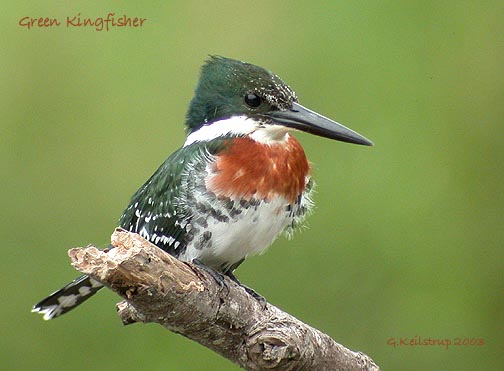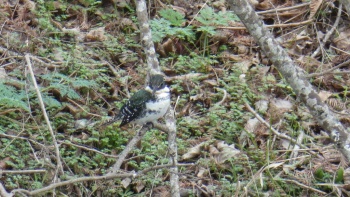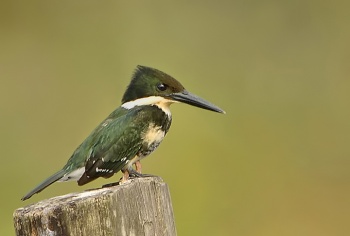m (switch stub for incomplete, add location and date to photo caption) |
(→External Links: Removed eNature) |
||
| (15 intermediate revisions by 5 users not shown) | |||
| Line 1: | Line 1: | ||
| − | {{ | + | [[Image:Green_Kingfisher.jpg|thumb|550px|right|Male<br />Photo by {{user|glendak2|glendak2}} <br />[[Sabal Palm Audubon Center|Sabal Palm Grove Sanctuary]], Brownsville, Texas, [[USA]], November 2003]] |
| + | |||
;[[:Category:Chloroceryle|Chloroceryle]] americana | ;[[:Category:Chloroceryle|Chloroceryle]] americana | ||
| − | |||
| − | |||
==Identification== | ==Identification== | ||
| + | [[Image:Kingfisher Green.JPG|thumb|350px|right|Female<br />Photo by {{user|knnthdhrvy|knnthdhrvy}}<br />[[Guadalupe River State Park]], [[Texas]], February 2018]] | ||
| + | 19 to 20 cm [7.5 to 8 inches]) Short tail and long, strong bill | ||
| + | *Dark glossy green | ||
| + | *White underparts and collar | ||
| + | *Green spotting on breast and sides | ||
| + | *White markings on the wings and tail<br /> | ||
| + | '''Male''' has broad chestnut-colored breast band.<br /> | ||
| + | '''Female''' has one or two green spotted breast bands. | ||
| + | ====Similar species==== | ||
| + | [[Amazon Kingfisher]] | ||
==Distribution== | ==Distribution== | ||
| + | [[North America|North]], [[Central America|Central]] and [[ America]] | ||
Southern [[Texas]] to northern [[Argentina]] and northern [[Chile]] | Southern [[Texas]] to northern [[Argentina]] and northern [[Chile]] | ||
==Taxonomy== | ==Taxonomy== | ||
| − | + | ====Subspecies==== | |
| + | [[Image:RV8P4042-GREENKINGFISHER12.jpg|thumb|350px|right|Female, subspecies ''mathewsii''<br />Photo by {{user|gaviao-real|gaviao-real}} <br />Ilha de Marajó, [[Brazil]], April 2007]] | ||
| + | This is a [[Dictionary_M-S#P|polytipic]] species consisting of five subspecies<sup>[[#References|[1]]]</sup>: | ||
| + | *''C. a. hachisukai'': | ||
| + | :*Extreme southern [[Arizona]] to west-central [[Texas]] and north-western [[Mexico]] | ||
| + | *''C. a. septentrionalis'': | ||
| + | :*South-central Texas to southern [[Colombia]] and western [[Venezuela]] | ||
| + | *''C. a. americana'': | ||
| + | :*Tropical [[South America]] (primarily east of Andes); [[Trinidad]]; [[Tobago]] | ||
| + | *''C. a. cabanisii'': | ||
| + | :*Western Colombia and western [[Ecuador]] west of Andes to northern [[Chile]] | ||
| + | *''C. a. mathewsii'': | ||
| + | :*Southern [[Brazil]] and [[Bolivia]] to northern [[Argentina]] | ||
==Habitat== | ==Habitat== | ||
| + | Riparian woodlands; shade trees on the banks of rivers and resacas, preferring sheltered pools | ||
==Behaviour== | ==Behaviour== | ||
| + | Rarely hovers. | ||
| + | ====Diet==== | ||
| + | They dive from a low perch for small fish. They also eat aquatic insects. grasshoppers and small lizards. | ||
| + | ====Breeding==== | ||
| + | The nest is a deep 2 to 3 foot tunnel high on a sandy bank near water. There is a small entrance, 2 to 3 inches wide, probably covered with plants, vines, or other vegetation draping over the entrance. Female lays three, sometimes four, eggs. | ||
| + | ====Vocalisation==== | ||
| + | '''Call''': a rattling call. | ||
| + | ==References== | ||
| + | #{{Ref-Clements6thAug17}}#Handbook of the Birds of the World Alive (retrieved October 2014) | ||
| + | #What Bird | ||
| + | #The Website of Everything | ||
| + | {{ref}} | ||
==External Links== | ==External Links== | ||
{{GSearch|Chloroceryle+americana}} | {{GSearch|Chloroceryle+americana}} | ||
| + | *[http://identify.whatbird.com/obj/936/_/Green_Kingfisher.aspx Whatbird] | ||
| + | *[http://bna.birds.cornell.edu/bna/species/621/articles/introduction The birds of North America Online] | ||
| + | *[http://www.npwrc.usgs.gov/resource/birds/forest/species/chloamer.htm Northern Prairie Wildlife Research Center] | ||
| + | |||
[[Category:Birds]][[Category:Chloroceryle]] | [[Category:Birds]][[Category:Chloroceryle]] | ||
Latest revision as of 17:30, 5 February 2020
- Chloroceryle americana
Identification
19 to 20 cm [7.5 to 8 inches]) Short tail and long, strong bill
- Dark glossy green
- White underparts and collar
- Green spotting on breast and sides
- White markings on the wings and tail
Male has broad chestnut-colored breast band.
Female has one or two green spotted breast bands.
Similar species
Distribution
North, Central and America Southern Texas to northern Argentina and northern Chile
Taxonomy
Subspecies
This is a polytipic species consisting of five subspecies[1]:
- C. a. hachisukai:
- C. a. septentrionalis:
- C. a. americana:
- Tropical South America (primarily east of Andes); Trinidad; Tobago
- C. a. cabanisii:
- C. a. mathewsii:
Habitat
Riparian woodlands; shade trees on the banks of rivers and resacas, preferring sheltered pools
Behaviour
Rarely hovers.
Diet
They dive from a low perch for small fish. They also eat aquatic insects. grasshoppers and small lizards.
Breeding
The nest is a deep 2 to 3 foot tunnel high on a sandy bank near water. There is a small entrance, 2 to 3 inches wide, probably covered with plants, vines, or other vegetation draping over the entrance. Female lays three, sometimes four, eggs.
Vocalisation
Call: a rattling call.
References
- Clements, J. F., T. S. Schulenberg, M. J. Iliff, D. Roberson, T. A. Fredericks, B. L. Sullivan, and C. L. Wood. 2017. The eBird/Clements checklist of birds of the world: v2017, with updates to August 2017. Downloaded from http://www.birds.cornell.edu/clementschecklist/download/
- Handbook of the Birds of the World Alive (retrieved October 2014)
- What Bird
- The Website of Everything
Recommended Citation
- BirdForum Opus contributors. (2024) Green Kingfisher. In: BirdForum, the forum for wild birds and birding. Retrieved 12 May 2024 from https://www.birdforum.net/opus/Green_Kingfisher






